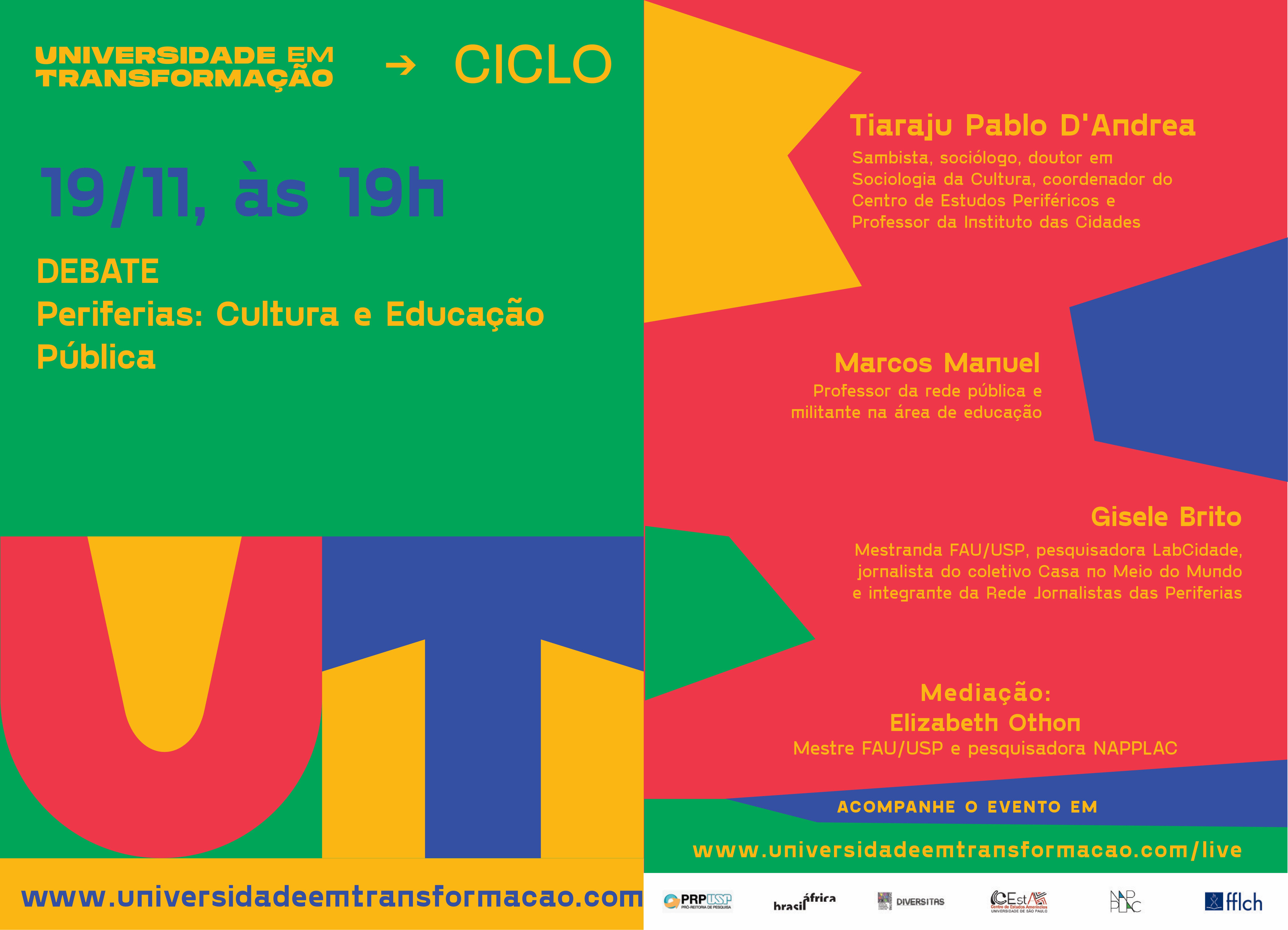In recent years, more and more young people from the periphery have accessed higher education, and particularly public universities. Public education is seen as another frontier crossed by young people from the periphery, who take peripheral culture into universities. The route derives from a historic trajectory of mobilization and struggles in the urban peripheries for the realization of rights and confronting socio-spatial segregation, including the right to education, activist and culture, both imbricated to the right to the city.
This debate aims to broaden the debate on the possible associations and contradictions between the political forms of culture and access to public education from the periphery. This connection is permeated by contradictions and is not always balanced. If, on the one hand, there are the creation of popular courses, the dissemination of knowledge through networks of peripheral culture and the expansion of research on urban space from the peripheral context, on the other hand there is the difficulty of staying and prejudice rooted in sectors that are still elitist at the university. .
Tiaraju Pablo D’Andrea - Sambista, sociologist and Professor at Instituto das Cidades - UNIFESP, his doctorate had as theme “The Formation of Peripheral Subjects: Culture and Politics in the Outskirts of São Paulo”. Coordinator of the Center for Peripheral Studies - CEP. Post-doctorate in Philosophy from the University of São Paulo (USP), he served as a guest researcher at Université Paris VIII, France (2017-2018), and at the École des Hautes Études en Sciences Sociales - EHESS, Paris, France (2016-2017) . He holds a PhD in Sociology of Culture, a Master in Urban Sociology and a degree in Social Sciences from USP.
Marcos Manuel - Historian. Director of School of Early Childhood Education in the city of São Paulo. He was Regional Director of Education for Pirituba Jaraguá between 2013-2016. It operates in the southern zone, together with the Santo Amaro Infancy and Occupies the City collectives, strengthening intersectoriality and territorial articulation.
Gisele Brito - Master's student at FAU-USP, researcher at LabCidade, journalist at the Casa no Meio do Mundo collective and member of the Jornalistas das Periferias Network.
Mediation: Elizabeth Othon - master FAUUSP and researcher NAPPLAC
About the Cycle of Lectures and Debates "University in Transformation: challenges and potential - Education, research and human rights in the 21st century in an interdisciplinary perspective"
The Cycle discusses themes such as democratization of access and permanence at the university, anti-racist struggle, indigenous rights, technology and online education, digital exclusion, academy and social movements, decolonization of thought, feminisms, interdisciplinarity and knowledge of blacks, indigenous, quilombolas riverside dwellers, immigrants, refugees, Africans, Arabs, people with disabilities, trans people, non-binary and LGBTQIA +, gender perspective, urban, rural and peripheral cultures, so that they can be heard and so that their narratives, knowledge, themes, experiences and experiences of oppression and diverse violence (epistemic, physical, psychological), as well as resistance, autonomy and empowerment, are incorporated by the university and valued in academic and extra-academic spaces.
For about 2 months (from 10/15 to 12/18), more than 100 speakers will interact, in videoconferences broadcast on Youtube, with a wide group of people on social networks (Youtube, Instagram, Facebook and Twitter) and on the website do Ciclo (www.universidadeemtransformacao.com).
Organized by 4 USP Research Support Centers: NAP Brazil Africa, NAP Diversitas - Center for the Study of Diversities, Intolerances and Conflicts, Center for Amerindian Studies (CEstA) and Center for Support for Research in the Production and Language of the Built Environment (NAPPLAC) , with support from USP's Dean of Research, the Cycle was designed, from the design of the format to the diversity of the participating guests, with the objective of expanding exchanges, dialogues and the horizontal sharing of knowledge among the members of the NAPs and between them , different universities, national and foreign, and different sectors of civil society.
Among the questions that the cycle "University in transformation: challenges and potential - Education, Research and Human Rights in the 21st century in an interdisciplinary perspective" will discuss are: How to value the themes listed above? How to expand the democratization of access and permanence at the university and strengthen its transformation? How to promote the decolonization of thought and dialogue with other knowledge that is not necessarily academic? How to guarantee the decolonization of academic practices (in face-to-face formats and also in the context of virtualization / hybridization of teaching)? How to ensure interdisciplinarity and a diversified theoretical foundation / bibliography?
Confirm the schedule of upcoming events at http://universidadeemtransformacao.com/programacao/.
Come join us in this debate!


